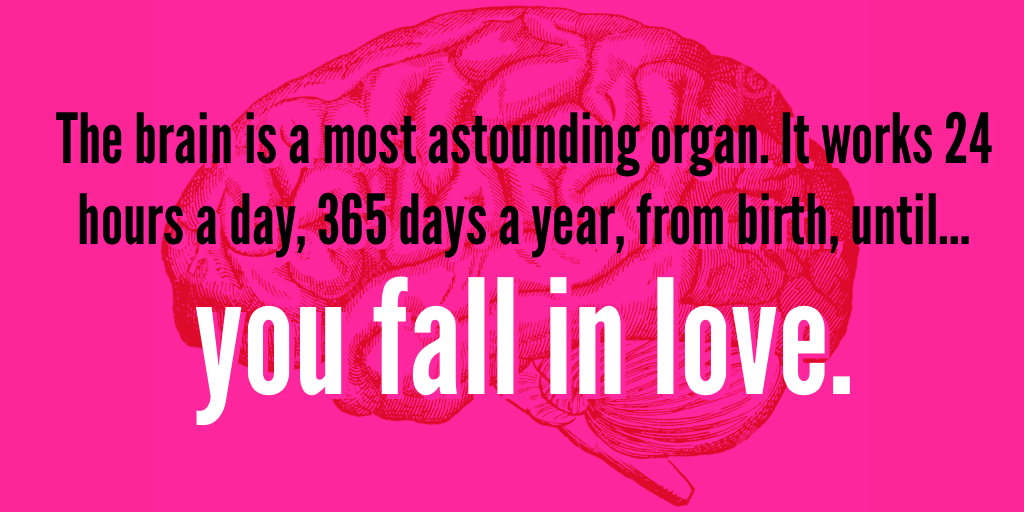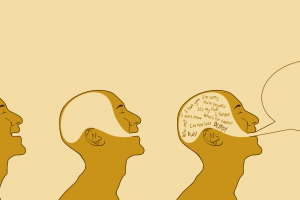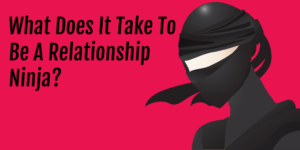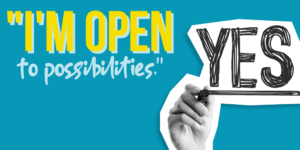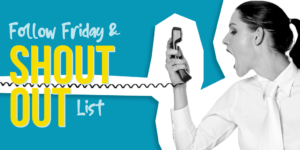Ha ha! It’s a joke, really. The brain doesn’t stop working.
But, in all serious, when you fall in love, the brain DOES stop working the way it usually does, and we are thrust into some sort of semi-drugged alternate reality.
And not the “Drugs are bad, mmmkay?” drugs. The natural highs our own bodies and brains give us for doing whatever they think we should be doing.
In this case, heading towards procreating and possibly continuing the species.
But don’t be fooled. Just because it’s a natural high does not mean that you are any safer of that it won’t sting as much or make you act any less foolishly than if you have a few too many drinks or smoke some of that Devil’s lettuce.
In fact, in many cases, it’s moreso.
Let’s take a look at the heavenly cocktail your brain forces on you when you get twitterpated:
Dopamine: Dopamine his part of your body’s reward system. It’s released during eating, listening to music, having sex, and fallen in love. It’s what makes you feel all gooey and happy to see your new affection, or even just to hear their name.
Oxytocin: Also known as the “love hormone,” oxytocin plays a part in boosting feelings of attachment, safety, and trust. Not only as you spend time together, but surging after affectionate and sexual touch, like walking hand-in-hand, kissing, or having sex.
Androgens: A group of hormones that includes testosterone, increase your desire for sex with the person you love. Having sex also boosts production of these hormones, which can lead to a cycle that’s also reinforced by the release of oxytocin and dopamine.
Cortisol: Cortisol is the stress hormone, and plays two parts in your love. As you are first falling in love, cortisol levels increase. Which makes sense, because as you are getting to know someone the stakes can seem pretty high for your future hopes of happiness together. Then, if you make it to long-term partnership, cortisol dramatically reduces, making you feel less stressed, happier, and better able to handle challenges.
Norepinephrine and Adrenaline: The hormones your body releases when you face danger or other crises. When you see, or even just think of, the person you love, you may feel tense and nervous. Your heart might begin to race, your palms sweat, and your face flush. You might feel a little shaky. Your words might seem to tumble out of nowhere.
And then there are the parts of your brain that get in on the action:
Amygdala and Frontal Lobe: When you fall in love, the amygdala and the frontal love, parts of your brain responsible for helping you detect danger and make good decisions respectively, step out for a smoke break, leaving you lacking these essential skills. This could lead to you doing something silly (perhaps a little dangerous) to impress someone you love? Or acting without thinking and doing something you’d never ordinarily consider.
This poor judgement can also reduce your ability to spot danger from your potential partner, or recognize red flags.
Anterior Cingulate Cortex: The part of the brain linked to obsessive-compulsive behaviors. So, when thoughts of your newfound love constantly pop into your head, and gum up your thinking, it can make focusing on other tasks more difficult and reduce your ability to reason through important tasks.
So, yeah.
Just a bit of fun.
And a whole lot of truth.
Our brains are all about us falling in love, and try to make that very easy. And in doing so, make us more than a little bit crazy.
Has your brain ever shut itself down over love? Did you ever do something you regret?
*smiles*


